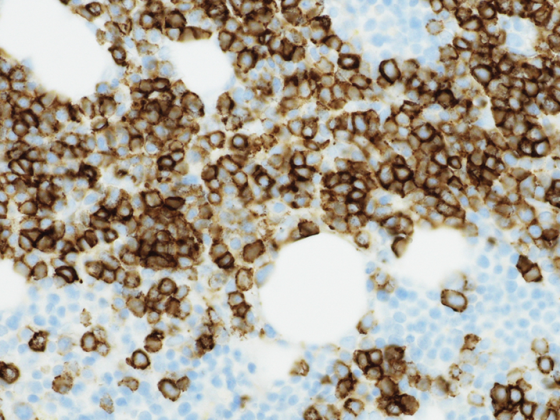Since January 1, 2024, the oral GnRH antagonist Relugolix has been approved in Switzerland for the treatment of adults with advanced hormone-sensitive prostate cancer [1, 2]. This gives patients access to oral androgen deprivation therapy (ADT) for the first time, which promises rapid and sustained testosterone suppression without an initial increase in testosterone and a good safety profile [1, 3].
To date, only injections have been available for ADT in advanced prostate cancer [3, 4]. GnRH agonists such as leuprorelin are frequently used, but these cause an initial testosterone surge [3, 5]. Orgovyx® (Relugolix) is the first oral ADT option in this setting and, as a GnRH antagonist, leads to rapid testosterone suppression without an initial relapse [1, 3]. Treatment is initiated with a loading dose of 360 mg (3 tablets) on the first day, followed by a dose of 120 mg/day (1 tablet/day) with individualized but consistent timing [1].
Rapid and sustained testosterone suppression
In the phase 3 HERO study, patients with advanced prostate cancer were randomized 2:1 and treated for 48 weeks with either Orgovyx® (120 mg orally, once daily; N = 622) or leuprorelin (injections every three months; N = 308) [3]. The primary endpoint was the sustained suppression of testosterone to castration levels (<50 ng/dl) over 48 weeks. Under Orgovyx®, 96.7 % (95 % confidence interval [KI]: 94.9 – 97.9) of patients maintained castration for 48 weeks, compared with 88.8 % (95 % CI: 84.6 – 91.8) of patients under leuprorelin [3]. In the Orgovyx® group, there was no initial increase in serum testosterone and by day 4, 56 % of patients reached the castration level of <50 ng/dl compared to 0 % with leuprorelin (p < 0.001). On day 4, the mean testosterone level was 38 ng/dl with Orgovyx® compared to 625 ng/dl with leuprorelin (Fig. 1) [1, 3].
Rapid restoration of testosterone levels after discontinuation
In a subgroup of 184 patients, testosterone recovery was monitored after discontinuation of Orgovyx® vs. leuprorelin therapy [3]. While patients taking Orgovyx® had a mean testosterone level of 288.4 ng/dl 90 days after discontinuation, this was 58.6 ng/dl in the leuprorelin group [3].
Safety comparable to other therapies
In the HERO study, the overall incidence of adverse events was similar in the Orgovyx® and leuprorelin treatment groups (92.9% vs. 93.5%) [3]. The most frequently observed adverse effects included hot flushes, fatigue, constipation, diarrhea, arthralgia and hypertension [3].
Conclusion
In summary, the newly approved therapy with Orgovyx® is superior to treatment with leuprorelin due to its rapid, sustained suppression of testosterone levels in advanced hormone-sensitive prostate cancer [3]. In addition, Orgovyx® does not cause an initial increase in testosterone [1, 3] and oral administration can avoid reactions at the injection site, errors during injection preparation and injection phobia. Orgovyx® therapy has a similar safety profile compared to leuprorelin and can be interrupted or discontinued more easily due to the rapid recovery of testosterone levels after discontinuation [3].

Figure 1) Mean serum testosterone levels of patients from baseline to week 48. Compared to leuprorelin (black), Orgovyx® (yellow) did not produce an initial testosterone surge and there was a rapid, sustained reduction in testosterone levels below the castration level of 50 ng/dl. Adapted from Shore et al. 2020 [3].
Abbreviations:
GnRH = gonadotropin-releasing hormone
Approval number: CH-01901 01/2024
The brief specialist information from ORGOVYX®
Literature
1. current ORGOVYX® Information for healthcare professionals, available at :
www.swissmedicinfo.ch
. Current status.
2. Specialty list Orgovyx®. Federal Office of Public Health (FOPH).
www.spezialitaetenliste.ch
, last accessed: 5.1.2024.
3 Shore, N.D., et al, Oral Relugolix for Androgen-Deprivation Therapy in Advanced Prostate Cancer. N Engl J Med, 2020. 382(23): p. 2187-2196.
4 Van Poppel, H. and L. Klotz, Gonadotropin-releasing hormone: an update review of the antagonists versus agonists. Int J Urol, 2012. 19(7): p. 594-601.
5 Oh, W.K., et al, Does oral antiandrogen use before leuteinizing hormone-releasing hormone therapy in patients with metastatic prostate cancer prevent clinical consequences of a testosterone flare? Urology, 2010. 75(3): p. 642-7.
Article online since 24.01.2024











